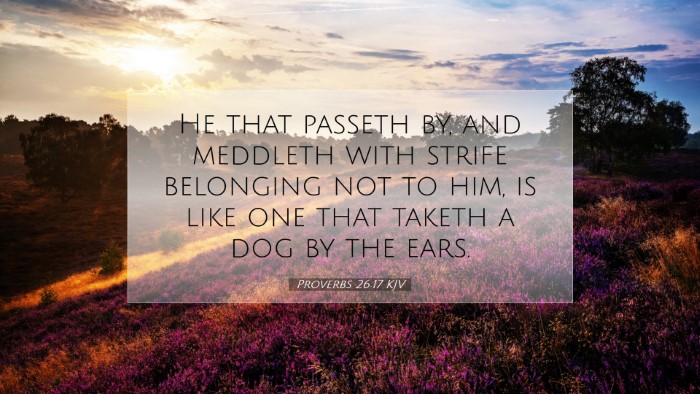Commentary on Proverbs 26:17
Proverbs 26:17 states: "He that passes by, and meddles with strife belonging not to him, is like one that taketh a dog by the ears." This verse encapsulates the folly and danger of interfering in disputes that do not concern us, using powerful imagery to convey its message.
Examination of the Text
From a surface level, the verse speaks of the act of engaging in strife that is not one’s own. The metaphorical use of a dog by the ears presents a vivid picture—a dangerous and foolish act that can lead to unwanted consequences. The instinctual reaction of a dog is to bite when threatened, indicating that meddling can lead to harm.
Insights from Matthew Henry
Matthew Henry elaborates on this verse by emphasizing the importance of self-awareness in conflicts. He underscores that the man who intervenes in another's quarrels—without invitation or necessity—acts foolishly. Such meddling can often escalate the situation, drawing the meddler into contention and trouble that they may have otherwise avoided. Henry notes that wisdom dictates that one should avoid provocations that can lead to strife, especially when they are not personally invested.
Albert Barnes' Perspective
Albert Barnes provides a detailed interpretation of the proverb's metaphor. He compares taking a dog by the ears to grabbing something that is naturally aggressive and unpredictable. Barnes emphasizes the inherent danger in meddling with conflicts of others, indicating that one risks being bitten, both literally and metaphorically. He also points out that today’s meddler might believe their involvement is helpful, but often these actions lead to more significant troubles than intended. Thus, he encourages discernment and caution in interactions with others’ disputes.
Adam Clarke's Commentary
Adam Clarke offers a practical understanding of the verse. He discusses how this proverb underscores the foolishness of giving unsolicited advice or counsel in disputes where one has no stake. Clarke remarks that involvement in others' problems often leads to misunderstandings and conflicts that could have been avoided. He warns that such actions can disrupt peace and lead to additional strife. Clarke adds that taking sides without understanding the situation often results in accusations and enmity, highlighting the folly of letting curiosity or pride drive one to meddle.
Applications for Pastors, Students, and Theologians
The implications of Proverbs 26:17 extend into various realms of ministry, scholarship, and personal conduct:
- Pastoral Care: Pastors and church leaders are encouraged to be mindful of their involvement in congregants' conflicts—discerning when to intervene and when to counsel individuals to resolve their matters privately.
- Theological Reflection: For students of theology, this verse serves as a reminder of the wisdom literature's call for discernment, urging one to practice humility rather than engaging in debates and disputes that do not contribute positively to the community.
- Interpersonal Relationships: All believers are urged to reflect on their tendencies to interrupt or involve themselves in others' disputes. The danger of being drawn into unnecessary conflict is present, and wise counsel advocates for peace and resolution without meddling.
Conclusion
Proverbs 26:17 offers profound wisdom that resonates across generations. Through the insights of Matthew Henry, Albert Barnes, and Adam Clarke, we learn that meddling in others' quarrels is not just unwise but can be destructive. By recognizing our inclinations to intervene and guarding against them, we are called to cultivate a spirit of peace, focusing on our personal responsibilities and fostering reconciliation where genuine conflict arises. A wise individual knows when to pass by, leaving others’ disputes to be resolved without their involvement.


